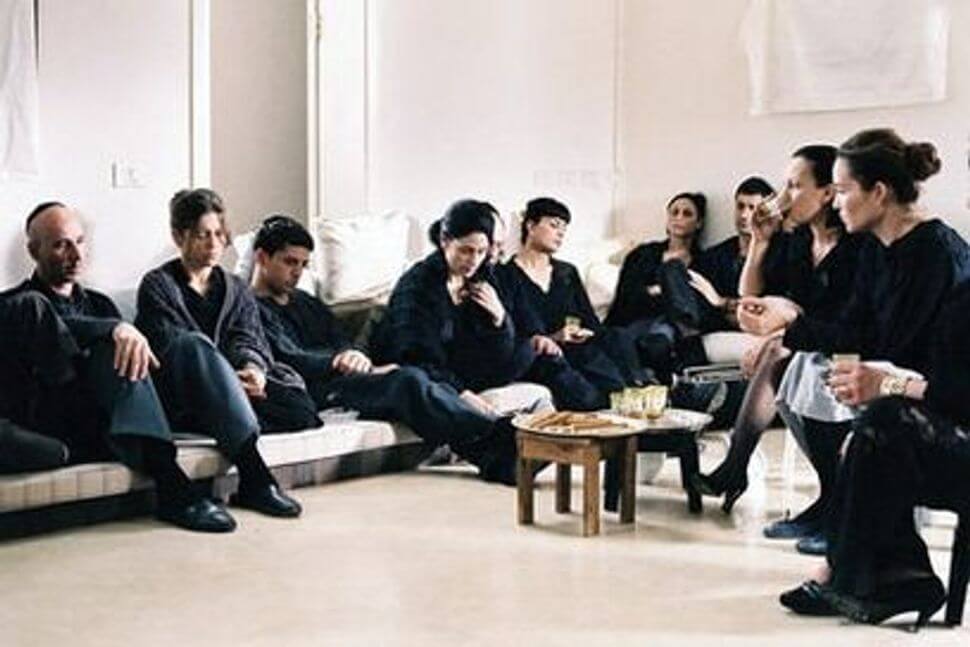
Graphic by Angelie Zaslavsky
What To Do And How To Act At A Jewish Shiva
Death is a difficult thing to process; not just for the mourners, but the entire community. And yet, through the process of sitting shiva, Jewish tradition has prescribed ways not just for the mourner to deal with the trauma, but for the community to provide comfort.
And when it comes to one’s decorum at a shiva house, there’s no hard-and-fast rules. Sure, there are basic guidelines, but often it comes down to getting a feel for the room in order to understand what is and isn’t comforting or appropriate. Here are some tips on how to go to a shiva house:
What To Do At A Shiva
Don’t ring the doorbell — just walk right in. In the majority of shiva homes, the door will be unlocked since the general public is invited to make a shiva call. Traditionally, often the mourner will be sitting on a low chair with a semi-circle of regular chairs facing him or her. Take a seat in one of those chairs, make eye contact with the mourner, but stay silent until the mourner speaks to you. Most importantly, keep your visit short. Shiva calls are uncomfortable as it is — don’t make it worse by overstaying your welcome and filling the silences with mindless prattle. If you start to feel awkward, that’s probably a good indication that you should leave.
How To Act At A Shiva
Remember, this isn’t a party, even if it can sometimes feel that way. Don’t socialize with friends you happen to encounter there, unless it’s a conversation that involves the mourner. And while mourners or visitors may say funny stories about the deceased, which will inevitably induce laughter, don’t allow your fit of giggles to spiral out of control. Avoid overly rambunctious laughter and its inevitable follow up — tasteless jokes.
What To Say At A Shiva
What to say is entirely dependent on the mourner you are visiting. It’s essential to gauge the mood in the room. Is it somber? Keep your voice low and serious; don’t try too hard to lighten the mood. Is the mourner talkative and seemingly upbeat? Then it’s okay to laugh, but don’t overdo it. The best rule of thumb is to wait for the mourner to say something before speaking up.
However, if you have a story about the deceased, or if the deceased did something meaningful to you, do share it. Those stories are comforting to most mourners. Sometimes, like in circumstances where the deceased’s death is particularly tragic — as with the sudden loss of a young child — just saying a simple “I’m so sorry” with a hug and sitting with the mourner is all you need to do.
Upon leaving, there is a formal farewell that is prescribed in Jewish tradition. It can be said in either Hebrew or English: “HaMakom Yenachaim Etchem Bitoch She’ar Avlei Tzion V’Yerushalayim,” or “May God comfort you among the other mourners of Zion and Jerusalem.”
What To Wear When Visiting Mourners At A Jewish Shiva
Making a shiva call isn’t going to be a party in any sense, but neither will it be a dark, depressing visit. In that vein, there is no requirement to wear black, nor do you need to worry if your outfit is a little too colorful. The key for dressing to go to a shiva is to be respectful of the family in mourning. And that can vary from family to family. For example, if the family is very religious, then keeping modesty and conservative dress top of mind is the way to go. You also don’t want to dress up and wear something too fancy or flashy; casual or business clothes (since people will often go on a shiva call right before or right after work) will generally do the trick. And keep things simple and understated; avoid loud, splashy prints and opt for a solid color.
Michelle Honig is the style writer at the Forward. Contact her at [email protected]. Find her on Instagram and Twitter.





















